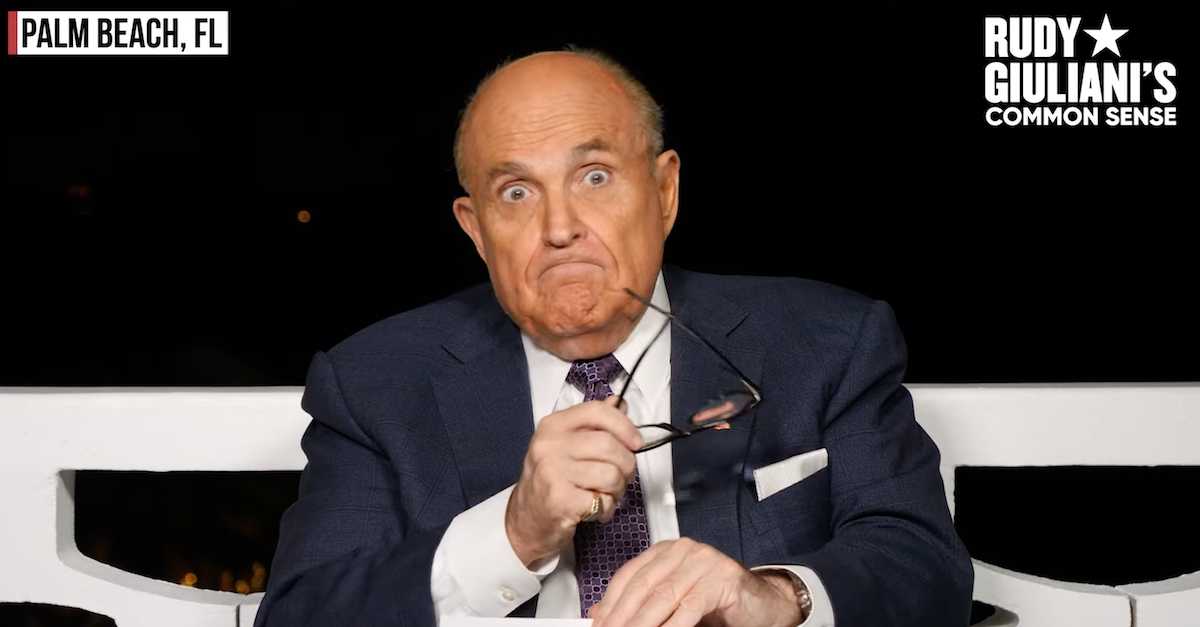
The District of Columbia Court of Appeals has suspended Rudy Giuliani‘s license to practice law in the nation’s capital city.
The move was announced in a two-page order of the court on Wednesday.
The order says the D.C. court system received a “certified copy” of New York’s recent decision to also suspend Giuliani’s law license in the Empire State. The New York decision triggered D.C. Bar Rule XI, § 11(d), the court noted. That rule, which is common among lawyer licensing jurisdictions, involves “reciprocal discipline.” In other words, when an attorney is in trouble in one jurisdiction, he is in trouble in all of them, as the cited rule points out:
(d) Temporary suspension and show cause order.
Upon receipt of a certified copy of an order demonstrating that an attorney subject to the disciplinary jurisdiction of this Court has been suspended or disbarred by another disciplining court, the Court shall forthwith enter an order (1) suspending the attorney from the practice of law in the District of Columbia pending final disposition of any reciprocal disciplinary proceeding, and (2) directing the attorney to show cause within thirty days why identical reciprocal discipline should not be imposed.
The remainder of the rule sets forth the parameters and timelines for back-and-forth communication between the court, the affected attorney, and disciplinary counsel who in essence represent the bar on behalf of the public.
Disciplinary Counsel shall reply to the attorney’s response to the show cause order no later than fifteen days after service of the response. Alternatively, no later than fifteen days after the attorney’s response was due, Disciplinary Counsel may object to the imposition of reciprocal discipline based upon the factors set forth in subsection (c) of this section. In either case, Disciplinary Counsel shall provide the Court with the relevant portions of the record of the proceeding in the other disciplining court, the statute and the rules that governed it, and a short statement identifying all of the issues that the matter presents.
If Disciplinary Counsel opposes the imposition of identical discipline, Disciplinary Counsel shall
(1) recommend appropriate non-identical discipline or
(2) request that the matter be referred to the Board for its recommendation as to discipline. The attorney may reply within ten days after service of Disciplinary Counsel’s submission.
Attorney discipline proceedings are in essence consumer protection proceedings: They are designed to ensure that a member of the public who hires a licensed attorney can count on the receipt of adequate and competent representation.
The D.C. Court of Appeals also ordered that its proceedings in Giuliani’s name are “hereby stayed pending the resolution” of the New York matter. In other words, the court doesn’t want to hear much more about the case until after New York authorities complete their inquiries. The brief order points Giuliani to several other bar rules if he wishes to apply for reinstatement.
Giuliani and his son have complained that the New York suspension was politically motivated.
The Washington, D.C. Court of Appeals is the capital city’s highest court. It is akin to a state supreme court in other jurisdictions. It is not the same as the U.S. Circuit Court of Appeals for the District of Columbia, which hears the appeals of matters which trigger federal questions or diversity jurisdiction.
Read the order below:
[image via YouTube screen capture]